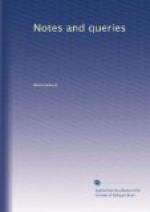G.W.
Hamilton Terrace.
* * * * *
JUNIUS.
The questions asked by your correspondent “P.” (No. 18. p. 172.) perplexed by their simplicity. The answer, if answer can be seriously required, was obvious. All that was ever urged in favour of every other claimant was against the claim of Sir George Jackson. Beyond this I know not what reply could be given. Emboldened by silence, “P.” now proceeds (p. 276.) to adduce certain evidence which he supposes has some bearing on the question. “I possess,” he says, “an unpublished letter by Junius to Woodfall, which once belonged to Sir George Jackson. My query is, ’Is it likely he would have obtained it from Junius, if he were neither Junius himself nor a party concerned?’” What can be the meaning of this, obtain from Junius a letter which Junius had sent to Woodfall? Why, it is obvious that Sir George must have obtained it as “P.” obtained it—as all autograph collectors obtain their treasures—directly or indirectly, by gift or by purchase, mediately or immediately from one of the Woodfalls—probably from Henry Sampson Woodfall—probably from George Woodfall, who has recorded the fact that he lent one letter to a Mr. Duppa, which was never returned. “P.” then proceeds a step further, and observes—“The manner in which Burke evades the question, as to himself being the author of Junius, makes me think two or three were concerned in these letters.” Well, and it made others think so half a century or more since. The three Burkes have often been named—the Burkes again, with the assistance of Samuel Dyer: and Mr. Prior put forth a very reputable argument in favour of the claims of the Burkes, but it was delicate and died young. If your correspondent has nothing to urge in favour of this conjecture, why disinter it? “P.,” however, has it in his power to do some service to the cause: let him send you, for publication, an exact copy of the Junius’ letter, following carefully the spelling, the capital letters, the instructions, and even the punctuation.
Mr. John Sudlow’s conjectures are still more simple. He evidently is not aware that when a public writer assumes a character he is bound to hold to it consistently; and that as “ATTICUS” was then writing on the subject of the national debt, and objecting to the financial policy of the minister, he naturally affected to be a fundholder, to be frightened, and to have, in consequence, removed his property. What a strange notion Mr. Sudlow must have of Steele and Addison, if he has read the The Spectator and The Tatler after this literal fashion. But I will not speculate on his speculations, but come to facts.




